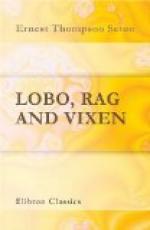Then all went cautiously up the stream, and on a sandy bank, well screened by brambles, they lay for all that afternoon, and learned how pleasant it was to feel the cool, powdery dust running between their hot little toes. With their strong bent for copying, they lay on their sides like their mother and scratched with their tiny feet and flopped with their wings, though they had no wings to flop with, only a little tag among the down on each side, to show where the wings would come. That night she took them to a dry thicket near by, and there among the crisp, dead leaves that would prevent an enemy’s silent approach on foot, and under the interlacing briers that kept off all foes of the air, she cradled them in their feather-shingled nursery and rejoiced in the fulness of a mother’s joy over the wee cuddling things that peeped in their steep and snuggled so trustfully against her warm body.
II
The third day the chicks were much stronger on their feet. They no longer had to go around an acorn; they could even scramble over pine-cones, and on the little tags that marked the places for their wings, were now to be seen blue rows of fat blood-quills.
Their start in life was a good mother, good legs, a few reliable instincts, and a germ of reason. It was instinct, that is, inherited habit, which taught them to hide at the word from their mother; it was instinct that taught them to follow her, but it was reason which made them keep under the shadow of her tail when the sun was smiting down, and from that day reason entered more and more into their expanding lives.
Next day the blood-quills had sprouted the tips of feathers. On the next, the feathers were well out, and a week later the whole family of down-clad babies were strong on the wing.
And yet not all—poor little Runtie had been sickly from the first. He bore his half-shell on his back for hours after he came out; he ran less and cheeped more than his brothers, and when one evening at the onset of a skunk the mother gave the word ‘Kwit, kwit’ (Fly, fly), Runtie was left behind, and when she gathered her brood on the piney hill he was missing, and they saw him no more.
Meanwhile, their training had gone on. They knew that the finest grasshoppers abounded in the long grass by the brook; they knew that the currant-bushes dropped fatness in the form of smooth, green worms; they knew that the dome of an ant-hill rising against the distant woods stood for a garner of plenty; they knew that strawberries, though not really insects, were almost as delicious; they knew that the huge danaid butterflies were good, safe game, if they could only catch them, and that a slab of bark dropping from the side of a rotten log was sure to abound in good things of many different kinds; and they had learned, also, the yellow-jackets, mud-wasps, woolly worms, and hundred-leggers were better let alone.




